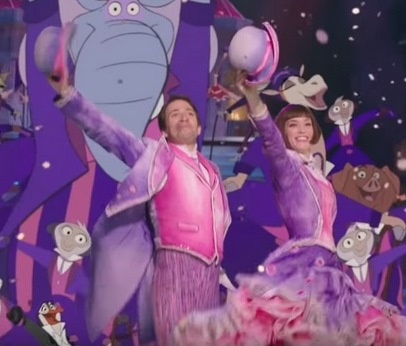Mary Poppins Returns
Friday between Christmas and New Year and things feel a bit flat, so . . .
“What’s on at the pictures?”
Which is how daughter and I came to be in one of the larger theatres of our local multi-screen yesterday settling down to watch Mary Poppins Returns. I grew up on the original Mary Poppins film. I still have the LP; I knew every word of every song.
I’m a Londoner (have I ever mentioned that to you?) and I’m particular about the Cockney accent and London locations. It is a measure of the popularity of Dick van Dyke in England that his appalling English accents (cockney as Bert the chimneysweep and RP as bank chairman Mr Dawes ) were overlooked and forgiven on the strength of his other virtues (singing, dancing, acting and generally being a decent bloke).
I was a little worried when I heard that his grown up apprentice Jack, now a lamplighter, was going to be played by American musical actor Lin-Manuel Miranda.
“Look Mum, they are keeping up the tradition of the first film already; just as the pantomime dame is played by a man, in this case the cockney is again played by an American. And look at this chap’s body of work already – he wrote Hamilton – he’s not just a pretty face”
In 54 years Dick van Dyke’s English accent (RP as Mr Dawes the younger, son of the original chairman) has not improved. But he can still dance at the age of 93. And it was lovely to see him, Karen Dotrice (young Jane in 1964) and Angela Lansbury in cameo roles.
The film opens with Jack riding a bicycle as he extinguishes the gas burning street lights while singing “Under the Lovely London Sky”. His singing accent is right, his voice as expected is excellent, and his ability to cycle while singing from the Tower of London to St Paul’s cathedral in less than two lines, without any breathlessness, could not have been achieved by Sir Bradley Wiggins. Jack’s spoken accent wasn’t quite so good but, had he had longer speeches, after a bit longer with the voice coach he would have been there.
The London filming locations are real, although the skyline is so altered since 1935, and the real Crystal Palace burned down in 1936 so CGI/painted backcloth/whatever would have been essential. The Royal Exchange is unmistakable, I was right in recognising Middle Temple and I am sure that some of the little streets off Smith Square with St John’s in the background were also used.
Leerie as a term for lamplighter is actually Scots. In English to be leery (alt. spelling leary) means to be wary. To be lairy means flash or ostentatious. The rhyming slang was half correct and half fanciful, but the tune was good. As a matter of irrelevant interest, these days some of the most creative rhyming slang comes out of Australia.
 In my personal opinion the best sequence was inside the china bowl belonging to the children, where they visit the Royal Doulton Music Hall and Mary and Jack sing a very true song called A Book is not its Cover. Jack does a really good patter song; very impressive. Patter songs are both a US and a British tradition. Danny Kaye was a big favourite in our house when I was growing up and this is one of his best (subjective opinion again).
In my personal opinion the best sequence was inside the china bowl belonging to the children, where they visit the Royal Doulton Music Hall and Mary and Jack sing a very true song called A Book is not its Cover. Jack does a really good patter song; very impressive. Patter songs are both a US and a British tradition. Danny Kaye was a big favourite in our house when I was growing up and this is one of his best (subjective opinion again).
Accent aside, Jack’s movements, mannerisms, presence were all convincing. And the sub-plot, a potential romance with Jane Banks, who works in adulthood for a trade union, was touching.
So far these were my original thoughts but when I tried an on-line search for the lyrics of the patter song element of A Book is not its Cover I found this review from US publication The Playlist. Apparently some people think the patter song is a rap and are outraged. I hate rap – but this isn’t a rap – it’s a good old fashioned patter song. However I can see how the roots of rap might be, inter alia, in the old patter songs, but this is the original form. And Lin-Manuel Miranda and the songwriters studied old time British performers Flanagan and Allen (Underneath the Arches, Run Rabbit, Run) AND Danny Kaye.
YES! Great minds are thinking alike. I picked up the influence. Gentlemen, your research worked.
This fussy, pedantic, traditionalist old Cockney enjoyed the film and was impressed. Thank you and good night.